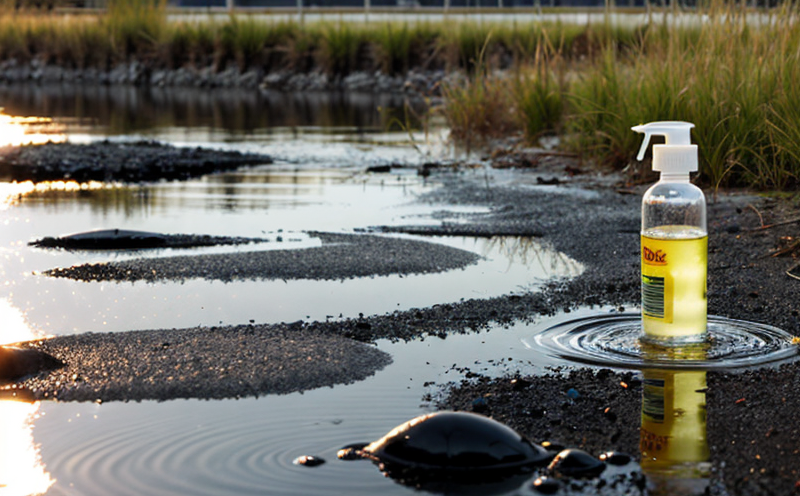ASTM D8026 Surfactants Test in Water
The ASTM D8026 test method is widely recognized as a key standard for measuring surfactants in water. This rigorous procedure ensures accurate and reliable quantification of surfactants, which are essential compounds used in various industrial applications such as cleaning agents, emulsifiers, and solubilizers.
The primary purpose of the ASTM D8026 test is to determine the concentration of surfactants present in water samples. This is crucial for monitoring environmental quality, ensuring compliance with regulatory standards, and optimizing industrial processes that involve water usage. The test method provides detailed procedures for preparing the sample, extracting surfactants, and quantifying them using advanced analytical techniques.
The ASTM D8026 procedure involves a series of steps designed to minimize errors and ensure precision in the results. These include:
- Sampling: Collecting water samples from relevant sources.
- Preliminary treatment: Filtering or adjusting the sample to remove particulates and other interfering materials.
- Extraction: Using appropriate solvents to extract surfactants into a separate phase.
- Analysis: Employing analytical techniques such as high-performance liquid chromatography (HPLC) or gas chromatography-mass spectrometry (GC-MS) to identify and quantify the surfactants present.
The test method is particularly useful for identifying and quantifying a wide range of surfactants, including anionic, cationic, amphoteric, and nonionic types. The results provide valuable insights into the composition and quality of water, which can inform decisions regarding treatment processes and environmental impact assessments.
ASTM D8026 is applicable to various types of water samples, including surface water, groundwater, wastewater, and industrial process waters. Its wide applicability makes it a versatile tool for different sectors, from municipal water supply systems to industrial manufacturing plants that rely heavily on water resources.
The ASTM D8026 test method is widely recognized for its robustness and reliability. It has been validated through numerous studies and is consistently used in both academic research and industry applications. The standard ensures consistent results across different laboratories, which enhances the credibility of the testing process.
In conclusion, the ASTM D8026 surfactants test in water is a critical tool for ensuring the quality and safety of water resources. Its rigorous procedures and precise methodologies make it an indispensable part of environmental monitoring and industrial processes that involve water usage.
Applied Standards
The ASTM D8026 standard is based on international best practices and aligns with other relevant standards such as ISO 17394, EN 15465-2, and IEC 62321. These standards provide a comprehensive framework for the testing of surfactants in water samples.
The ASTM D8026 procedure is designed to be compatible with various analytical methods, including HPLC and GC-MS, ensuring that the results are accurate and reproducible. The standard specifies detailed steps for sample preparation, extraction, and analysis, which ensures that all laboratories using this method produce consistent results.
The application of ASTM D8026 is not limited to a single sector but spans multiple industries including:
- Municipal water supply systems
- Industrial manufacturing plants
- Petrochemical refineries
- Agricultural operations
In each of these sectors, the ASTM D8026 test plays a crucial role in ensuring that surfactant levels are within acceptable limits. This contributes to environmental protection and compliance with regulatory requirements.
Why Choose This Test
- Precision: The ASTM D8026 procedure ensures highly accurate measurements of surfactants in water samples.
- Rigorous Validation: The test method has been validated through extensive research and is widely recognized for its reliability.
- Versatility: It can be applied to various types of water samples, including surface water, groundwater, wastewater, and industrial process waters.
- Compliance: Ensures compliance with international standards and regulatory requirements.
- Credibility: Produces consistent results across different laboratories, enhancing the credibility of the testing process.
- Cost-Effective: Long-term cost savings can be achieved by identifying and addressing issues early in the process.
The ASTM D8026 surfactants test is an essential tool for industries that depend on water resources. By providing precise, reliable data, it helps ensure environmental protection and compliance with regulatory requirements. The test method's versatility and precision make it a preferred choice among quality managers, compliance officers, R&D engineers, and procurement professionals.
Environmental and Sustainability Contributions
The ASTM D8026 surfactants test plays a crucial role in promoting environmental sustainability by ensuring that water resources are protected from contamination. By accurately measuring the levels of surfactants present in water samples, this test helps prevent excessive concentrations of these compounds from entering aquatic ecosystems.
Surfactants have been identified as potential pollutants due to their ability to disrupt natural processes and harm aquatic life. The ASTM D8026 procedure provides a reliable method for monitoring the levels of surfactants present in water samples, allowing for timely interventions if necessary.
- Reduction of Environmental Impact: By identifying and quantifying surfactant levels early on, this test helps prevent their accumulation in aquatic environments, thereby reducing the risk of environmental harm.
- Enhanced Resource Management: The accurate measurement of surfactants allows for better management of water resources, ensuring that they are used efficiently and sustainably.
The ASTM D8026 test is an important tool in the fight against pollution. By providing precise data on surfactant levels, it helps inform decisions regarding treatment processes and environmental impact assessments. This, in turn, contributes to a more sustainable future by ensuring that water resources are protected from contamination.





